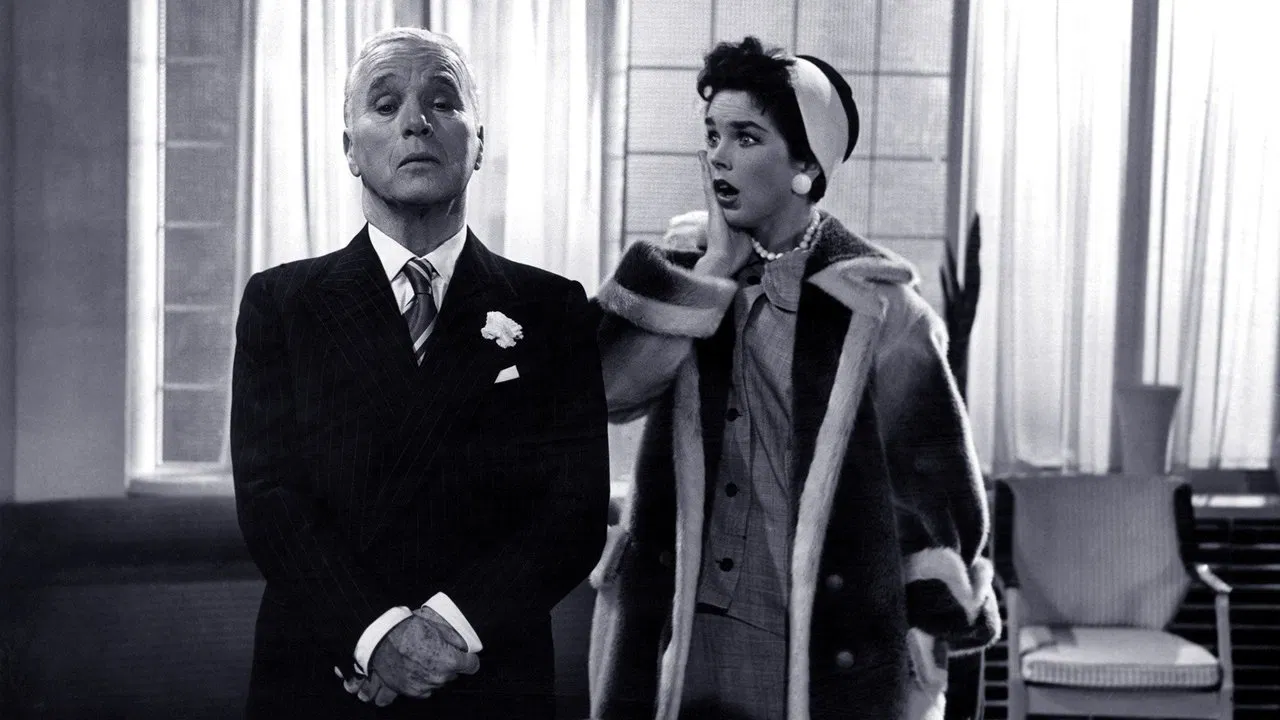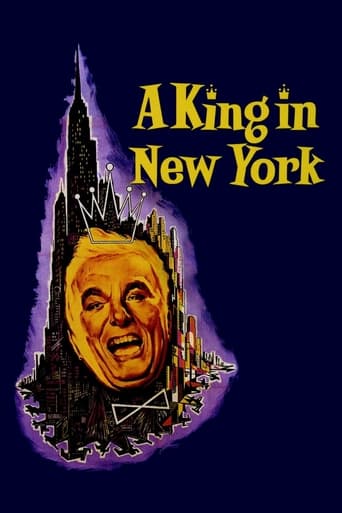

Am a big fan of Charlie Chaplin, have been for over a decade now. Many films and shorts of his are very good to masterpiece, and like many others consider him a comedy genius and one of film's most important and influential directors. It is hard to not expect a lot with all his feature films between 'The Kid' and 'Limelight' being very good to masterpieces. On that front Chaplin's penultimate film 'A King in New York' disappoints a little. As far as his feature films go it is one of his weaker ones, being nowhere near the standard of 'The Gold Rush', 'The Kid', 'Modern Times', 'The Great Dictator' and especially 'City Lights'. As far as his overall career goes it is nowhere near among his worst, including his early career short films it is much better than the worst of his Keystone period and even his much improved Essanay period had a couple of lacklustre ones. He also did a couple of historical curios and patchworks that this is also superior to. 'A King in New York' has its problems. It is one of his least visually refined feature films. Some of the camera work and editing are rough and the evoking of New York is not very convincing at all, it was made in England rather than being authentic and it is very obvious it was not shot in New York. Chaplin also lays it on far too thick with the political elements which, while admirably cutting and personal, felt very heavy-handed and not always needed. Especially what is said from the young boy. Chaplin is no stranger to including politics in his films and short films and they are not subtle, but it comes over as very bitter and aggressive here in a way that wasn't there previously. A few parts go on too long too and could have been trimmedHowever, the music is good, neither intrusive or out of place. Chaplin does give a typically great performance and the supporting cast acquit themselves well too. Chaplin is not at his most inspired in the directing but the expertise is still there and handled well.The film is never dull either, while the satirical element is sharp, the comedy is genuinely funny, there is some very thought-provoking insight and there is some sentiment/pathos that is very touching while not being over-the-top or overused.Summing up, good but didn't blow me away. 7/10 Bethany Cox
... View MoreAlthough not a shred of footage was shot in New York and the cast was 98% British players, A King In New York which did not get released in the USA until the House Un-American Activities Committee had ceased to exist remains a stinging indictment of American culture of the McCarthy era. Charlie Chaplin being a premier victim of the era knew from whence he spoke and wrote.The idea of an exiled monarch from Ruritanian type royal house presumably under your typical royal family being a Communist is an oxymoron on the face of it. Yet that is exactly what Charlie Chaplin is accused of in A King In New York. Under what power an American Congressional Committee could compel testimony is still not clear, but HUAC did that too when it thought necessary.Chaplin decides to settle here, try out America before sending for his exiled Queen Irene Audley. But as funds run low, he's forced to sell his most prize possession, the good name of the monarchy in a slew of advertising schemes as launched by Dawn Addams and Sid James. Seeing the king sell all kinds of 'royal' products was pretty amusing itself.But when he visits a 'progressive' school and hears young Michael Chaplin spouting off the virtues of Karl Marx at the drop of a hat, he's taken with the kid although exasperated at being the butt of the jokes of these unruly kids. Later on when he takes the kid in after finding him on his hotel steps and the press hears him going on his Marxist jag, the exiled king is accused of being a Communist and has to go before HUAC. Chaplin waters down his testimony to the chagrin of the committee.Although Chaplin had abandoned his little tramp character at this point and the famous Hitler like mustache was gone, he still had some marvelous sight gags worthy of his silent classics. A King In New York, born out of Chaplin's exiled bitterness remains a really unjustly neglected piece of comedic satire and relevant truths of the time.
... View MoreA KING IN NEW YORK was Charles Chaplin's penultimate film and his first in his native Britain.The actual plot,that of an exiled European monarch (King Shadov) and his various adventures in the USA's biggest city,was most certainly intended irony by Chaplin as he himself was in exile from the US after years of harassment and condemnation from McCarthyites,the HUAC,moralists and various other right-wing factions.It was many years before he was persuaded to return to the US in the early 1970's (to receive an honorary Oscar),and indeed this film was not shown there until around the same era.Chaplin clearly had many issues he wanted to address at the state of American society at this time,and although it is perfectly laudable to bring up these many subjects in a satirical film,the perceptions of US society involved (film,television,advertising,plastic surgery,education,etc.) are sadly not all that funny,cutting or ruthless enough,but rather half-hearted and uninventive.The best moments occur in the first half or so,with an adroit lampoon of film trailers and widescreen ratios;some neatly executed (but all too brief) mime concerning the description of caviar and turtle soup,and the highlight being King Shadov's struggle to contain his laughter during a slapstick nightclub act after undergoing plastic surgery.However,other would-be mordacious barbs at other subjects such as TV and advertising are rather placidly administered (at least Chaplin's skit on a reality-style TV show is surprisingly prescient),and the second half of the film turns far more serious when the matter of the McCarthyite witch hunts comes to prominence.The film certainly gets bogged down at this point with tedious,witless,pompously over-sermonising dialogue,most of which is uttered by Chaplin's ten-year old son Michael,portraying a boy that the King meets during a visit to a school,whose parents are affected by the anti-communist purges.To be fair,Chaplin Jnr actually gives a fine performance,perhaps a slightly more assured one than his celebrated father whose clipped,rather hesitant manner of speaking conveys a reluctance to enunciate too excessively (not very surprising,as Chaplin always made it clear he was far more comfortable with pantomime than speech).This may be the reason why he gave his son the most sententious lines in his script,which don't as much come across as normal conversation but rather as gross political pronouncements,further emphasised by a continually wagging finger.Chaplin was justified to feel bitter at his treatment by the American authorities,but the sledgehammer non-subtlety he employed to make his point here was woefully superfluous,and it is only his son's natural adeptness at performing that prevents the scenes involved slipping this side of total embarrassment.Because it was produced in the UK,the film further suffers within it's limitations of monetary production compared to the US.Much stock footage of the Big Apple is utilised,plus some rather obvious back projection and super-impositions,giving the film a rather stagey,claustrophobic if not cheap feel,with famous cameraman Georges Perinal unable to give the film a visually stylish look with the unexceptional set designs at his disposal.Most of the British supporting cast don't make any attempt with American accents,though the inimitable Sid James comes off best in this aspect,with Dawn Addams also not too bad with her transatlantic drawl (though her occasional romantic mutterings with an obviously ageing Chaplin are a trifle creepy).Familiar British performers make brief appearances (such as George Woodbridge and Jerry Desmonde),with Oliver Johnston as the King's confidante coming off best,and an unexpected cameo from a very young Frazer Hines (he of EMMERDALE FARM) as an unhygienic cookery pupil at the school King Shadov visits.If Chaplin had not concentrated too much on the political elements and pared down the masses of straight,expository dialogue related to this,A KING IN NEW YORK would have probably been a quicker,more biting invective on America in the 50's.It is therefore mostly the case that only brief sequences in the first hour come off with any sort of distinction;the rest,predominately an essay on his personal bitterness,should've been disposed of.RATING:6 out of 10.
... View MoreOne of the inconveniences of the modern world is that kings are now subject to revolution; fortunately for King Shahdov he managed to flee his European kingdom with his wealth before his people could overcome him. He arrives in New York keen to re-establish himself and maintain his status as a monarch but it is not long before American life overtakes him and he feels the effect of television, advertising, plastic surgery and political witch-hunts.Although I was concerned what I would find, I felt I should check out some of Chaplin's final films. Wholly made in England after Chaplin after he left America and was refused re-entry, it will be of no surprise to find that this film is a rather barbed commentary on many aspects of American life but what will surprise many is just how blunt the majority of it is. Despite apparently taking nearly two years to write, the plot is essentially a series of scenarios that allow for various satires of the US and as such it is very broad and obvious. Many others have commented on the lack of laughs but I didn't really have a problem with this because a filmmaker is quite welcome to branch out and do something more than comedies if they so desire. However what I do have a problem with is the way that I was hammered with the points being made in a way that suggests I would not be smart enough to understand unless it was painted in massive letters.This is not to say that the film is without value because actually the points it makes are interesting enough to carry the film even if they are crudely made. Watching it from fifty years in the future it has an extra value in seeing the "problems" of American society being highlighted and comparing them with today the same in many areas with only the scale being different. Otherwise though it simply is not clever or subtle enough to stand up as anything more than an OK film. Where it should be biting and cutting like a sharp weapon it comes over like a lead-pipe of satire it is still interesting but it is hard to overlook that it is a very blunt tool.
... View More